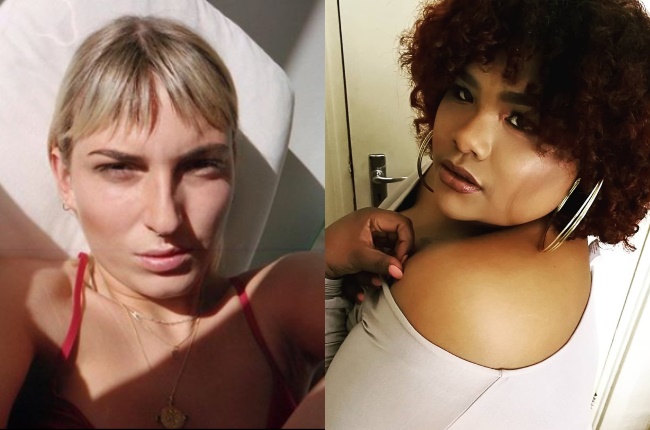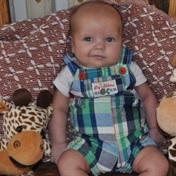
She thought she was just a late bloomer. That’s how the teen explained it to herself that by age 14 she still wasn’t menstruating. But when her voice suddenly started deepening, alarm bells began to ring.
Along with this Dani Coyle from Wiltshire in the UK, was also experiencing painful stomach cramps.
Suspecting something may be wrong, she visited a doctor who referred her to a specialist. Tests were done which revealed that she had XY chromosomes - typically found in biological males.
Scans also showed that she lacked female sex organs and instead had testicles, which were located inside her abdomen. The doctor explained that the medical definition for all of this was that she is intersex.
This is a general term used for a variety of conditions in which a person is born with a reproductive or sexual anatomy that doesn’t seem to fit the typical definitions of female or male.
Crystal Hendricks, the co-ordinator for
Intersex South Africa, says intersex people are born with sex characteristics
that do not fit typical binary notions of bodies designated “male” or “female.”
“In some cases, intersex traits are visible at birth, while in others they are not apparent until puberty. Some intersex variations may not be visibly apparent at all,” explains Crystal, who is intersex.
Anil Padavatan of African transgender and gender diversity advocacy group Gender Dynamix points out that being intersex isn’t the same thing as being transgender.
People who are intersex experience variations of difference in sexual development, including reproductive organs that cannot be classified as either male or female; external reproductive organs that are different from internal reproductive organs; genetic differences; and differences in the way that hormones affect the body, Anil says.
Transgender people, on the other hand, have an internal sense of gender identity that is different to the sex that was assigned at birth.
However people who are intersex and those who are transgender often share similar experiences of stigma, discrimination and social marginalisation, Anil adds.
Although Dani was devastated to find out
she was intersex, it didn’t come as a complete surprise.
“When I was 10, I noticed things changing in my body that were more typical of what happens in male development,” Dani recalls.
“My voice lowered in tone and my period never came. It was an extremely confusing and lonely time.”
Crystal says she too realised that something wasn’t right at the age when puberty usually commences.
“When I was in my teens, between 12-14, I never got my monthly menstruation. This led me to see a gynaecologist and after many invasive sessions it was discovered that I was born without a uterus, however I had internal testes,” she said.
“My mom was than coerced into having my testes removed as the doctor said they could become cancerous.”
Crystal’s intersex condition is known as CAIS or Complete Androgen Insensitivity Syndrome.
Doctors also advised Dani that they could “normalise” her “medical defect” through surgery and hormone replacement. In 2009, in addition to having an op to remove her testes, she underwent cosmetic surgery to alter the appearance of her vulva.
Now, looking back, both she and Crystal say they feel they were forced into surgery unnecessarily.
“I was told and believed it to be a secret that no one needed to know so I quickly underwent the surgery to remove my testes and normalise my external appearance – just as the doctors and surgeons recommended,” 25-year-old Dani says.
“Since surgery I had to go on hormone replacement therapy as the doctors removed the testes in my body that was providing the oestrogen,” said Crystal.
She will therefore need to take supplementary hormones for the rest of her life.
“I am angry that my mom was misinformed to have me admitted for surgery as now I am dependent on hormone replacement,” she says. “People are also not aware of intersex variations so intersex people face a lot of discrimination.”
Now as an activist, Dani his hoping to raise awareness around intersex surgery, particularly those performed on young children without their consent.
“We are robbed of bodily autonomy in the name of gender binary,” she says. “For many, the idea there are only two sexes and genders is way more convenient – disregarding those of us who don’t fit in to ‘either’ and ‘or.’
"If I had known then what I do know, I wonder if I would have chosen the surgeries or harboured as much shame and disgust for myself as I did for so long.”
Crystal through her work at Intersex SA, has lots to add regarding medical practice and how intersex patients are treated.
“Doctors treat intersex as an abnormality
that must be corrected,” she says. “This usually results in ‘corrective’
surgery that will result in the infant being assigned one of the two socially
accepted sexes.
“This is obviously problematic and this entire model of care is based on normalisation and suppression.
Anil explains that these surgeries, which are often performed on young children, can have devastating emotional consequences.
“These decisions are made by the family and doctors on behalf of a new-born child, at a stage when it is impossible for them to know whether the child identifies as male or female, or possibly a non-binary gender identity,” he says.
“Many children grow up and find that they do not identify with the gender that has been assigned to them.”
Dani agrees that forced surgeries may result in gender identity issues.
“These surgeries are forced upon intersex babies every day, many of whom end up with a gender identity that doesn’t align with their body’s presentation because it was chosen for them by someone else,” she says.
“I want to see the end of non-consensual, cosmetic intersex genital surgeries on babies and children.”
The movement towards autonomy and consent has been a big issue for those within the LGBTQIA+ community.
Crystal stresses that intersex people should seek guidance if they need to.
“Firstly know that there is nothing wrong with you, boxes are for things and not for humans so do not let society box you into the binaries of male and female,” she said.
“Reach out to Intersex SA and do as much research about your body before making any medical decisions.”
Source: The Sun, Intersex Society of North America




 Publications
Publications
 Partners
Partners

















